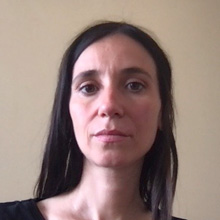Tell us about yourself: where do you come from, what do you teach at Ca' Foscari University, what are your interests and areas of Research?
My name is Giulia Rispoli. I was born in Foggia in the Tavoliere delle Puglie, a land of transhumance, sun and wheat. Since I was a child, I have been lucky enough to spend four months a year on the Tremiti Islands, so I have some islander blood in me, which is well suited to my new career in the lagoon.
Starting next semester, I will be teaching 'Environment, Science and Global Policies' and 'History of Scientific Institutions'. I came to Ca' Foscari University as a Historian of Science and Technology – a field that I do not separate from philosophy – but I have always sought interdisciplinarity. My areas of research extend from the history of systemic thought to the theories of the global environment after the Second World War, and in particular to studies on the Anthropocene, a term that indicates the current geological epoch in which the anthropic impact that is now exerted on all the components of the Earth System has become apparent.
What is your academic background?I used to travel to and from Rome even before discussing my Master's Degree thesis at La Sapienza University. My first trip was to the Faculty of Arts at the fascinating and imposing Lomonosov University in Moscow, where I stayed for several months to do bibliographic and archive research on a philosopher called Aleksandr Bogdanov. I have indelible memories of my time in Russia.
I worked as a post-doc in several international departments and institutes (both scientific and humanities) such as the Centre for Complex Systems Studies at the University of York in England, the Museum of Natural History in Paris and the Cohn Institute in Tel Aviv. In 2016, I arrived in Berlin, a place I called home for six years. There, I worked as a researcher in Department 1 under the direction of Juergen Renn from the Max Planck Institute for the History of Science. Those were years of great growth. It was in Berlin that I feel I learnt the secrets of the trade.
What have been your greatest professional satisfactions?here are several, and I hope there will be as many in the future. I will focus on two in particular. The first is when I finished a course on the Anthropocene at Indiana University, Bloomington, USA. It was quite an arduous undertaking, as I was teaching in the Faculty of Atmospheric and Earth Sciences while being a Visiting Professor in a Department of History and Philosophy of Science and Medicine, teaching both Bachelor’s and Master’s Degree students from a wide variety of faculties. It was a challenge on all fronts. At the end of it, some of them sent me letters full of gratitude, begging me to stay in Bloomington. I got on very well indeed – also thanks to my conversations with Professor Nico Bertoloni Meli, whom I still thank for welcoming me and making me feel at home.
The second accomplishment was when I won the Rita Levi Montalcini competition, which brought me back to Italy. Venice was the only place I wanted to go.
What is a field that you have always wanted to work on but have not yet had the opportunity to explore?
Thematically speaking, I would say contemporary art, which I approached in my last project Anthropogenic Markers, where I had the opportunity to work with artists. I want to continue in this direction, especially now that dialogue with science and ecology is an integral part of artistic practice and reflection, and the Anthropocene offers a perfect platform for interdisciplinary overlaps.
Art also provides me with a way to refocus on the various expressions of human culture. Until now, I had pursued the study of broader systems, which include the human component as one of its parts. It may seem somewhat old-fashioned, given that the current tendency is rather the opposite, i.e., to focus on the non-human and post-human, but I think the Anthropocene presents a special opportunity to refocus on an anthropocentric perspective, which is the only one we can really act on and which we have a duty to shape.
What is your message to young people approaching research today?here are times when it is easy to get discouraged, when the competition is such that you feel overwhelmed even before you get involved. There is also competition in academia, not only in companies. To young people who approach research in a climate where excellence is now directly proportional to belonging to an elite, I say that it is good to cultivate concrete experiences, to come into contact with different realities and hybrid languages. Imagination, intuition and sensitivity are enriched in the field, and when one returns within the academic walls, unexpected visions will open up that will help in the career path.

